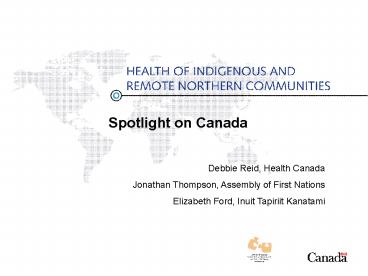Spotlight on Canada
1 / 18
Title:
Spotlight on Canada
Description:
Elizabeth Ford, Inuit Tapiriit Kanatami. Perspectives on the North. In Canada, the North is characterized by its geographical, cultural, and political perspectives. ... –
Number of Views:39
Avg rating:3.0/5.0
Title: Spotlight on Canada
1
Spotlight on Canada Debbie Reid, Health Canada
Jonathan Thompson, Assembly of First
Nations Elizabeth Ford, Inuit Tapiriit Kanatami
2
Perspectives on the North
- In Canada, the North is characterized by its
geographical, cultural, and political
perspectives. - To some the North is defined as North of about 53
degrees latitude (taking in the Territories and
the Northern regions of provinces). - To others it means North of 60 (where the
Territories and the Arctic begin). - The North is the traditional homeland to Inuit
and First Nations, as well as a defining feature
of the Canadian identity. - Politically, it is a region of intertwining
jurisdictions territorial, provincial, federal
and Aboriginal - a vast expanse rich in resources
but also environmentally fragile, sparsely
populated and costly to service.
3
Jurisdictions and Organizations
- Government of Canada
- Indian and Northern Affairs Canada
- Health Canada, Public Health Agency
- Other departments including Human Resources and
Social Development - Indigenous Governments and Organizations,
including - Assembly of First Nations
- Inuit Tapiriit Kanatami
- Council of Yukon First Nations
- Provincial and Territorial Governments
4
Health and Jurisdiction
- Provinces and territories provide
- hospital and physician services
- community and public health programs
- supplemental insurance
- long term care
- regulation
5
Health and Jurisdiction
- Federal government provides or funds
- community health programs in First Nations
communities (primary care, communicable chronic
disease control) - environmental health, mental health addictions,
children youth - Non-Insured Health Benefits (drugs, dental, etc.)
for all registered First Nations people and Inuit
6
Canadian Perspective
- Delivering health services in the North is
particularly challenging due to remoteness and
high cost of delivering such services. - Inuit and First Nations play a key role in
delivering health services in the North. - Improving the health status of FN/I requires
collaboration across jurisdictions and sectors.
7
2007 Projected Registered Indian Population
8,347
17,743
53 Latitude
127,533
105,592
130,335
131,910
72,565
178,080
33,645
Total 805,750
8
First Nations
- Varying cultures and languages
- Face higher rates of disease life expectancy is
5-7 years below national average - Living conditions is ranked 63rd or amongst Third
World conditions - FN communities in northern regions of provinces
face similar health challenges as those north of
60.
9
Challenges for First Nations
- F/P/T jurisdictional disputes - cost of health
services, i.e. Jordans Principle - Geography Remoteness
- High cost of living and food security
- High rates of diseases and addictions
- Lack of infrastructure inadequate
housing/water - Lack of/Limited health human resources and
- Addressing intergenerational impacts from
abuses suffered in Residential Schools.
10
Opportunities for First Nations
- Foster collaborative partnerships with F/P/Ts
which focus on building capacity of FNs to
govern and administer health services - Tripartite agreements that integrate F/P/T health
services to better meet health care needs of
FNs - Joint development of policy and programs and
- Tele-health/medicine can assist with limited
health services in the north.
11
Inuit Across the Arctic
- Approximately160,000 Inuit in the Northern
Circumpolar Region - Sharing a common culture and heritage across the
Arctic
12
Inuit Nunaat
13
Challenges to Health Delivery Inuit Nunaat
- Geography and remoteness
- Population sparse and widely dispersed
- HHR Recruitment Retention
- High cost of living
- Lack of infrastructure
- Lack of Inuit-Specific data
14
Life Expectancy
15
Opportunities for Collaboration
- Promoting increased awareness and sharing amongst
the federal, provincial, territorial and Inuit
partners regarding Inuit realities and health
priorities, including the importance of Inuit
children and youth
16
Opportunities for Collaboration (Continued)
- Applying an Inuit-Specific Lens using
Inuit-Specific Data - Sharing best practices models
- Addressing jurisdictional challenges
- Using a social-determinants model and partnering
with other sectors
17
- Any Questions?
18
- Thank you































